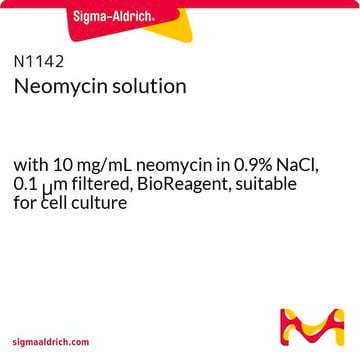G1279
G 418 disulfate salt
powder, suitable for plant cell culture, BioReagent
Synonym(s):
Antibiotic G418
About This Item
Recommended Products
product name
G 418 disulfate salt, suitable for plant cell culture, BioReagent
product line
BioReagent
Quality Level
form
powder
potency
≥720 μg per mg (Dried basis)
technique(s)
cell culture | plant: suitable
color
white to off-white
solubility
100 mg/mL (H2O clear)
antibiotic activity spectrum
Gram-negative bacteria
application(s)
agriculture
Mode of action
protein synthesis | interferes
storage temp.
2-8°C
SMILES string
OS(O)(=O)=O.OS(O)(=O)=O.CN[C@H]1[C@H](O)[C@@H](OC[C@@]1(C)O)O[C@H]2[C@H](N)C[C@H](N)[C@@H](O[C@H]3O[C@H]([C@H](C)O)[C@@H](O)[C@H](O)[C@H]3N)[C@@H]2O
InChI
1S/C20H40N4O10.2H2O4S/c1-6(25)14-11(27)10(26)9(23)18(32-14)33-15-7(21)4-8(22)16(12(15)28)34-19-13(29)17(24-3)20(2,30)5-31-19;2*1-5(2,3)4/h6-19,24-30H,4-5,21-23H2,1-3H3;2*(H2,1,2,3,4)/t6?,7-,8+,9+,10+,11-,12-,13-,14+,15+,16-,17-,18+,19-,20+;;/m0../s1
InChI key
UHEPSJJJMTWUCP-NKCAIAFTSA-N
Looking for similar products? Visit Product Comparison Guide
General description
Application
Caution
Preparation Note
Signal Word
Danger
Hazard Statements
Precautionary Statements
Hazard Classifications
Resp. Sens. 1 - Skin Sens. 1
Storage Class Code
11 - Combustible Solids
WGK
WGK 3
Personal Protective Equipment
Certificates of Analysis (COA)
Search for Certificates of Analysis (COA) by entering the products Lot/Batch Number. Lot and Batch Numbers can be found on a product’s label following the words ‘Lot’ or ‘Batch’.
Already Own This Product?
Find documentation for the products that you have recently purchased in the Document Library.
Customers Also Viewed
Our team of scientists has experience in all areas of research including Life Science, Material Science, Chemical Synthesis, Chromatography, Analytical and many others.
Contact Technical Service








